
2021-22 TRANSFORMING LIVES.
ANNUAL REPORT
As Chair of the Washtenaw Community College (WCC) Board of Trustees, it is a privilege to work with the college as it continuously adapts, responds, and transforms in these challenging times. We’re proud to be able to meet the needs of our students, community members, and partners throughout the region.
We are back on campus this year and so pleased with the way college faculty and staff have brought WCC’s academic classes, student services and activities, and other programming back to campus. Once again we have a thriving, vibrant on-campus environment. Simultaneously, the college sustained and enhanced its full array of award-winning, flexible online, hybrid, and virtual courses to meet the needs of our diverse student population — along with online and on-ground services to foster student success. And as trustees, we are particularly proud to have been able to freeze WCC’s in-district tuition for the fifth year in a row.
The college’s critical function in creating a highly educated workforce and driving economic development in the region only continues to grow. We are always seeking new, innovative ways to rise to this challenge, including programs of diversity, equity and inclusion. Other examples are our programming in mobility and cybersecurity; partnerships with employers on rapid training to fill industry needs; customized academic and career support for adult students returning to school; and continued growth of our training partnerships with the trades, which have an estimated $20 million annual economic impact on Washtenaw County.
It is of paramount importance to members of the Board of Trustees to ensure that WCC achieves its mission of “making a positive difference in people’s lives through accessible and excellent programs and services.” We are proud to be part of the college’s success as it continues to play this vital role in the community.
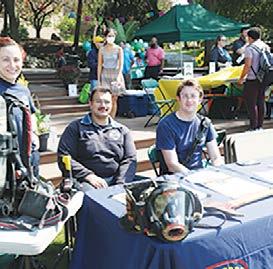 William G. Milliken, Jr.
William G. Milliken, Jr.
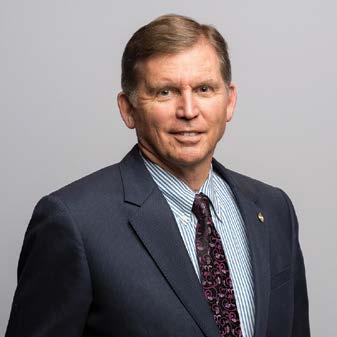 Chair, Board of Trustees
Chair, Board of Trustees

Washtenaw Community College
In the blink of an eye, another amazing year has passed at Washtenaw Community College (WCC).

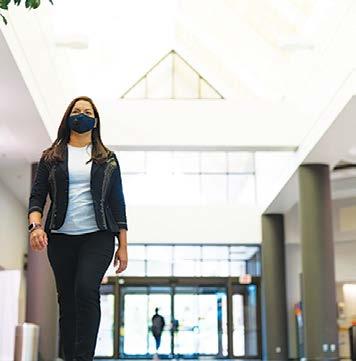

I am so proud and grateful for everything our outstanding faculty, staff and students have accomplished in the past year.
The theme of our 2021-2022 Annual Report is "Transformation." At its core, our mission is rooted in transforming the lives of everyone we serve.
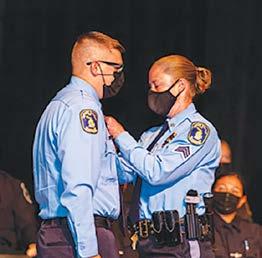
In this year’s report, you will find so many examples of transformation in action. We begin with our graduates, who persevered through the disruption of a worldwide pandemic to receive their diplomas during a formal in-person graduation ceremony in June. You’ll read about the thousands of skilled trades workers who converged on our campus this summer for training to advance in their professions.
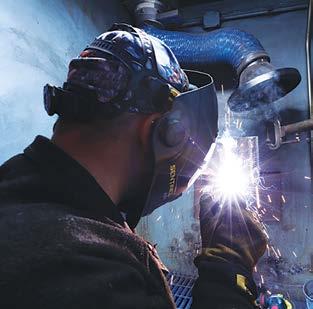
You’ll see how we worked with employers to develop curriculum to educate students in advanced transportation, electric vehicle and mobility sectors to fill talent needs. You’ll learn how we kept young people engaged in STEAM-related activities as they consider their future educational and career paths. You’ll also learn about programs for adults who have never obtained a degree and have turned to WCC to improve their lives through education.
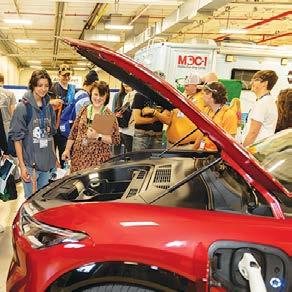
WCC is unwavering in its commitment to student success – meeting and supporting students of all ages and from all walks of life – helping them be their very best.
The stories inside this publication demonstrate many of the things WCC achieved to support students and our community in the past year. All of this is possible with the support of our Washtenaw County residents who believe in the power of education to improve and transform lives.
I would like to sincerely thank our community for its support of WCC. We couldn’t do what we do without you.
With warm regards,
 Rose B. Bellanca, Ed.D. President, Washtenaw Community College
Rose B. Bellanca, Ed.D. President, Washtenaw Community College

THE CHAIR FROM THE
FROM
PRESIDENT
2 3
4

CAUSE FOR CELEBRATION
A return to on-campus learning, pomp and circumstance and continued savings for students

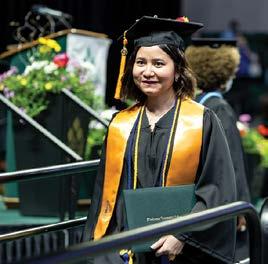
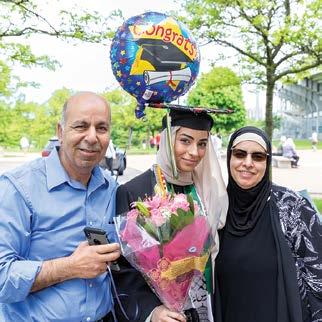




W

hat a welcome scene! Hundreds of cap and gown-clad, smiling graduates cross the stage one by one, family and friends shouting their approval from the audience as the graduates wave the diploma handed to them by Washtenaw Community College President Dr. Rose B. Bellanca.
In a time of upheaval, one thing that never changed was WCC’s commitment to providing an affordable education, a stance exemplified by two of the year’s biggest stories.
In April, the college announced tuition for in-district students would remain frozen at $95 for on-campus courses for the fifth consecutive year, maintaining its status in the lowest cost quartile among Michigan community colleges.
“WCC is the community’s college, and we are committed to offering an exceptional education at an affordable tuition for all students,” Bellanca said.
Months later, WCC proudly touted it was offering its first Z-Degree, a full 60-credit General Studies in Math and Natural Sciences associate degree program that can be completed with zero textbook costs. The college exceeded its own institutional goal of providing a Z-Degree by 2023 thanks to a campus-wide commitment to use free Open Education Resources (OER) or other textbook alternatives in a growing number of courses.
Since the OER movement was adapted in 2017-18, annual student savings has steadily increased to $2.38 million in 2021-22. That brings the overall savings to more than $9.32 million over five years.
“This first Z-Degree is the result of years of hard work by many people across our organization,” Bellanca said. “Our growing zero textbook cost efforts help tremendously with affordability, and students can be assured that the quality and content of the materials is exceptional.”
3,672 degrees and certificates granted 19,360 students who took credit courses 1,426 1,761 earned


An on-campus Commencement Parade was a fun and unique solution to celebrate the WCC Classes of 2019 and 2020; but the return to an in-person, formal Commencement Ceremony for the Class of 2021 was jubilant symbolism that the COVID-19 pandemic no longer had control of our higher education system. As more and more students returned to a vibrant campus throughout the 2021-22 academic year, so did on-campus student activities and long-standing, in-person traditions like graduation and Honors Convocation.Certificates 64% Graduates who received financial aid 28 Average Age of Graduates 58% Woman Graduates
32% Minority graduates
enrolled in non credit professional development and personal enrichment classes 6,688 WCC 2022 2,453 Unique Graduates
Of the graduates who earned an associate degree:
FOUNDATION SCHOLARSHIPS BENEFIT STUDENTS

The mission of the WCC Foundation is to give hope and support to Washtenaw Community College students through scholarships and other philanthropic help, creating a better educated workforce and a stronger community.
During the 2021-22 academic year, the WCC Foundation provided more than $2 million in total funding to WCC students in the form of scholarships and support through the Student Emergency Fund. The Foundation also provides philanthropic support for faculty grants designed to fund various student programs and activity.
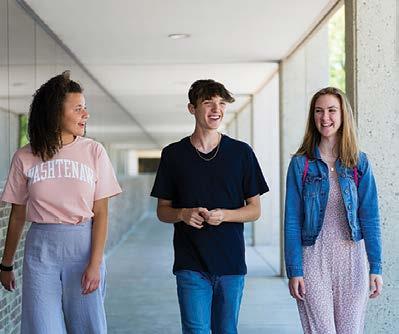
The Student Emergency Fund helped students infinancial distress remain in school, providing more than $10,000 for urgent needs, such as food insecurity, rent shortages, technology access, and childcare issues. More than 84 percent of students assisted remain in school or graduate!

New this year, the WCC Foundation Women’s Council funded a successful pilot program to help students requiring uniforms, such as scrubs for Health Science students or steel-toed boots and other safety equipment for Welding students. The initiative will be opened up to other students in need.
READING’S GIFT INVESTS IN FUTURE CAREGIVERS
Seeking ways to strengthen our region’s nursing profession, Ann Arbor philanthropists and long-time Washtenaw Community College supporters Agnes and Stephen Reading came up with a generous solution. Their $1 million gift to the WCC Foundation created an endowment that will fund 10 annual full-ride scholarships in perpetuity for WCC nursing students. An additional gift of $50,000 funded the Reading Nursing Scholars immediately for the 2022-23 school year.
“Nurses are the soul of a hospital. Ensuring excellent nursing care for people in our community is of utmost importance to us,” Stephen Reading said. “I’ve been in the hospital a lot and have met many nurses. Agnes and I have been moved by the care we’ve received from nurses and have made good friends.”
Reading Scholars receive funding for all tuition, books, exam fees and equipment needed to complete three years at WCC. Students may then transfer to Eastern Michigan University, where they can earn a Bachelor of Science in Nursing.
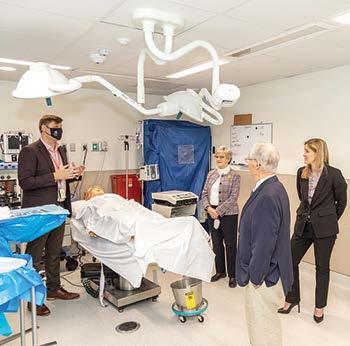
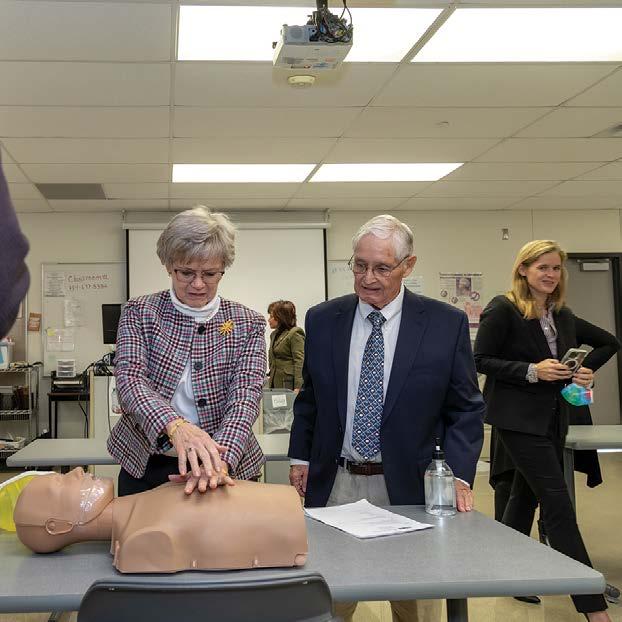

”We are beyond thrilled the Readings have made this very generous gift to WCC and our nursing students,” said President Dr. Rose B. Bellanca. “Now more than ever the world needs excellent, caring nurses, and WCC
prepares students by arming them with the education they need coupled with the real-world experiences employers seek.”

The Readings chose to make their generous donation to WCC, stating that while a seven-digit sum is a drop in the bucket at a major research institution, it is a life-changing amount for a community college.
Open Education Resources (OER) helped students save a total of $2.38 million in 2021-22.

Since 2017, WCC students have saved a total of $9.32 million by using these replacements for traditional textbooks.
Nurses are the soul of a hospital. Ensuring excellent nursing care for people in our community is of utmost importance to us. I’ve been in the hospital a lot and have met many nurses. Agnes and I have been moved by the care we’ve received from nurses and have made good friends.”

$31,281,129 Total Financial Aid 6,249 Students received some type of financial aid $5,204,537 Scholarships $12,110,972 Loans $93,490 Work-Study
$13,872,130 Grants
FINANCIAL AID
A GIVING COMMUNITY
6 7
–Stephen Reading Ann Arbor Philanthropist
“
EMERGING SECTOR
TRAINING TO FILL TALENT NEEDS
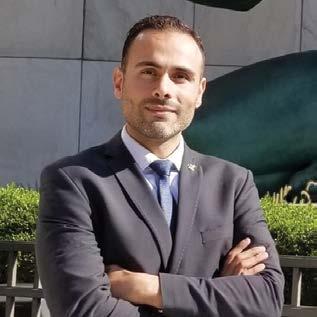

THE FUTURE OF MOBILITY
WCC’s Division of Economic and College Development (ECD) continued helping regional businesses and individuals innovate and benefit from opportunities within emerging sectors like mobility, which includes machine learning, data analytics, cybersecurity, networking and programming.
In 2022, the college strengthened its online professional development and fast track classes to include data analytics and fiber optics. These classes are designed to arm individuals with industry-recognized credentials in rapidly growing employment sectors such as connected transportation and the infrastructure required to maintain and build smart cities.
Fiber optics is a key element of all “smart” technology, and WCC provides extensive practical training for those working or pursuing employment in telecommunications or occupations that support smart city infrastructure development.
“As we are planning on expanding with fiber, we had a number of our technicians, product managers and IT employees take the fiber optics training with WCC,” said Tony Geara, Deputy Chief of Mobility Innovation for the City of Detroit. “All I got was GREAT feedback. I kept hearing back from every level that we now have a better understanding of fiber, everything from splicing it to putting RFPs/designs together. I would highly encourage other agencies to take advantage of the training.”
The college is focused on developing training programs to fill the employment gap in emerging sectors, which will only expand given the $1 trillion transportation infrastructure bill passed by the U.S. Congress in February 2022.
BELLANCA DISCUSSES TRAINING NEXT-GEN MOBILITY WORKFORCE AT GLOBAL SYMPOSIUM
Washtenaw Community College has been at the forefront of the fast changing transportation and mobility sectors. President Rose B. Bellanca's commitment to partnering with industry to understand its needs and develop programs to educate and train the next generation workforce is widely recognized.
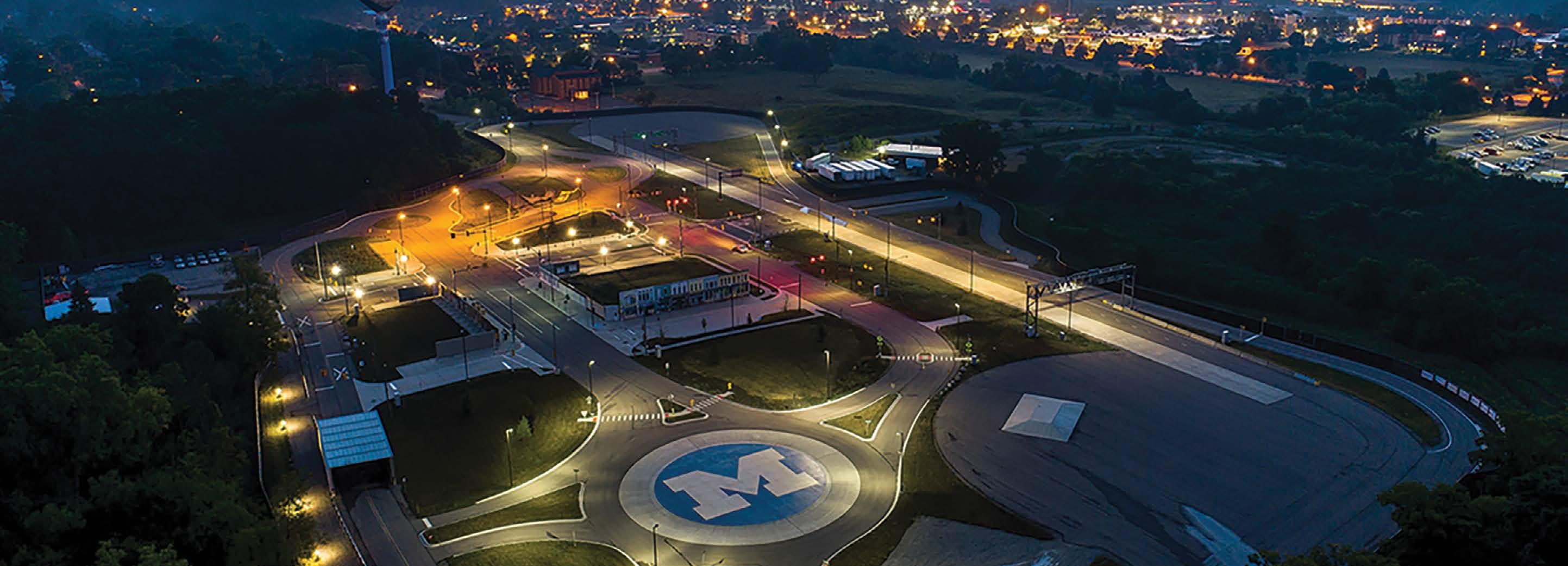
In April, Dr. Bellanca was invited to deliver a keynote address at the fifth annual Global Symposium hosted by the Center for Connected and Automated Transportation (CCAT). The only community college in the six-year-old CCAT consortium led by the University of Michigan, WCC applies the research and knowledge gained from the partner research institutions in the classroom.
In 2014, WCC launched its Advanced Transportation Center (ATC) — which uniquely combines automotive technologies, advanced manufacturing and IT into a holistic curriculum approach. Through a succession of action items that have followed, including acquiring and integrating the EV Ford Mustang Mach-E into its courses — the first community college in the state to do so — WCC keeps its eye on the future to prepare students.
“In the fast-changing world of connected and automated transportation, we all have an important role in harnessing the vision, ideas, research and hard work that we’ve been engaged in for the past six years through the CCAT grant, and we have a responsibility to take our work to the next level,” Bellanca told the Global Sympo sium gathering of researchers, automotive engineers, industry execu tives, policy makers and other transportation and mobility experts.
Dr. Bellanca highlighted the skills and talent required to work in the emerging mobility sector and discussed the importance of training students in automotive cybersecurity, data analytics, fiber optics and more to prepare the future workforce.
MACH-E Electrifies Learning
The bright red all-electric Ford Mustang Mach-E served as much more than just an attraction for auto shows and mobility events during the 2021-2022 school year. Acquired to prepare students for the rapidly evolving automotive industry, the college’s new EV was incorporated into numerous transportation technologies courses to give WCC students an up-close look into the future of mobility jobs.

In the summer of 2021, WCC was the first community college in the state to acquire the Mach-E. Throughout the following school year, students used the vehicle to learn how to diagnose, repair and calibrate advanced driver assistance systems and battery electric motor powertrains.

At any given time, the college enrolls 1,000 students in more than 60 automotive and cybersecurity technology career pathways and courses for skill-building and job training.
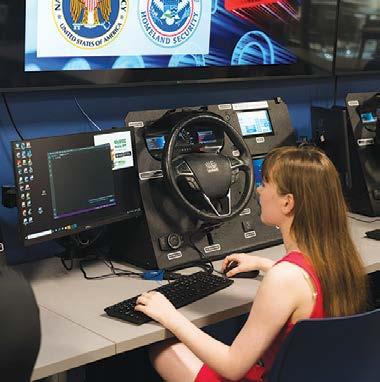 DR.
DR.
8 9
University of Michigan Mcity autonomous vehicle test facilty. Photo Credit: Levi Hutmacher/Michigan Engineering, Communications and Marketing
SUCCESS
MIDDLE SCHOOL STUDENTS INVITED TO SUPER STEAM SATURDAYS!

To pique the interest of area youth, WCC’s annual Super STEAM Saturdays are monthly fun and interactive glimpses into the world of science, technology, engineering, arts and mathematics careers. Geared toward middle school students, the free events are led by WCC faculty, alumni and community partners.
ashtenaw Community College rolled out the red carpet in July for Michigan’s Lt. Gov. Garlin Gilchrist
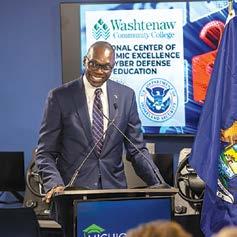
II to kick off a statewide tour promoting $6 million in new wrap-around services for the Michigan Reconnect and Futures for Frontliners programs.
The Lieutenant Governor and other state officials hosted a press conference in WCC’s brand new Automotive Cybersecurity Lab and introduced Carmen Samaniego who shared her story of how the Reconnect state tuition program has allowed her to pursue her dreams of studying computer science at WCC.

Carmen, one of 2,038 WCC Reconnect students who had enrolled through the Summer 2022 semester, credits the college’s many support services, such as the tutoring center and advisors, for her successes. Another 2,600 were in the pipeline.
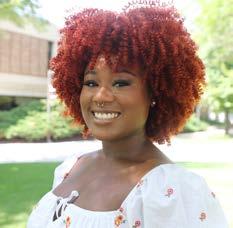
Those 25 and older who do not already have a degree or certificate are eligible to enroll in the state Reconnect tuition scholarship program.


The Futures for Frontliners program – launched during the pandemic to help health care workers return to further their education – has enrolled 2,409 students at WCC since it began in Winter 2021.
In all, the tuition awards to date for students enrolled at WCC through both programs total $4.5 million
The new $6 million in wraparound services are designed to help ease the path for working-age adults who’ve returned to college through one of the programs. The new grants can be used for expenses such as books, childcare, internet access and transportation.
A $3 million National Science Foundation grant was awarded in 2021 through the MI-LSAMP (Michigan Louis Stokes Alliance for Minority Participation) to Washtenaw Community College and five other colleges and universities to help continue the push to increase equity in STEM education fields.


WCC has been collaborating with the University of Michigan, Michigan State University, Wayne State University, Western Michigan University and Mott Community College since 2017 when $4.25 million was initially awarded by NSF to increase retention, graduation and success among traditionally underrepresented minority students.
WCC opens HBCU Pathway


WCC locked arms with Historically Black Colleges and Universities in Mississippi, Louisiana and Ohio to launch the HBCU Pathway to help ease the transfer process for community college students. It was the first comprehensive HBCU transfer program in Michigan that guarantees admission, opens in-state tuition and scholarships and provides ongoing student support for students transferring associate degrees.
Participating institutions include Jackson State University and Mississippi Valley State University in Mississippi, Southern University at New Orleans in Louisiana and Central State University in Ohio.
Between waived fees, the difference between in-state and out-of-state tuition and scholarship awards, WCC transfer students through this new pathway can potentially save students thousands of dollars.
The agreement also waives application fees and provides student support and mentoring from staff, faculty and HBCU alumni, arranges college tours at HBCUs, and hosts community-building activities, monthly career workshops and a student leadership summit.
COMMUNITY INVITED TO LIBERAL ARTS WEEK


WCC celebrated National Arts and Humanities Month in October 2021 with its first Liberal Arts Week celebration, a series of interactive virtual and in-person workshops that showcased how a liberal arts education empowers personal and professional success and sustains a fair and just society.

Keynote speakers during the events in 2021 and 2022 included: WCC alumna Christopher Shephard, a consultant at Boston Consulting Group; Yodit Mesfin-Johnson, CEO of Nonprofit Enterprise at Work and founder of Black Men Read; Madison Rally, promotions director at Cumulus Media, Ann Arbor; Eli Savit, Washtenaw County prosecuting attorney; Ari Weinzweig, co-founder and CEO of Zingerman’s Delicatessen; Alicia Puig, co-founder of PxP Contemporary and Director of Business Operations for Create! Magazine.
Another highlight of Liberal Arts Week at WCC was a Careers in Communication, Media, and Theatre Arts Panel & Networking Workshop featuring Nicole A. Brown, Mayor Pro-Tem, City of Ypsilanti; David Wolber, Artistic Director of Theatre NOVA in Detroit; Nick Kessler, WCC grad and morning show radio host in upstate New York; and Patty Griffin, Director of Conduct, Conflict Resolution and COVID Response at the University of Michigan.
TOP PERFORMING EDUCATIONAL INSTITUTION 2,923 First Generation College Students 1,124 Single Parents MORE THAN 100,000 ENROLLMENTS, INLCUDING: DEMOGRAPHICS Associate Degrees Offered 57 PROGRAM OFFERINGS 4 Year College & Transfer Agreements 86 Certificates Offered 81
W
618 Students with Disabilities 541 International Students 55,022 Online Virtual Classroom 29,911 Online Distance Learning 6,319 Mixed Mode On-Campus and Online 30,396 Traditional On-Campus
STUDENTS CONNECT
RECONNECT AND
ADULT
WITH
FUTURES FOR FRONTLINERS
NSF grant Drives Equity in STEM Education
SUPPORTING STUDENT
10
WCC alumna Aisha Bowe, a former NASA engineer and current tech CEO, leads a Super STEAM Saturday session in June 2022.
EDUCATION
554 Veterans
WCC’s new Automotive Cybersecurity Lab debut in the summer of 2022 seemed a crowning moment in the college’s role of preparing a generation of new cybersecurity experts.


But in reality, WCC’s leadership in fueling the growing talent pipeline needs in an ever-increasing digital world has been building for years.
In 2020, the college was recognized as a National Center of Academic Excellence in Cyber Defense Education by the U.S. National Security Agency and the Department of Homeland Security.
Today, WCC offers a range of programs to educate and train students for high-wage, high-demand jobs of the future in a more digitized and data-driven world.
Specifically, the college offers a Cybersecurity Associate Degree, an Automotive Cybersecurity Certificate and other cyber certificates.
The demand is great, with about 667,600 new jobs forecast in computer and technology occupations by 2030, according to the U.S. Bureau of Labor Statistics. Examples of median salaries include $107,628 for computer network architects; $94,515 for information security analysts; and $70,616 for computer programmers.

The new Automotive Cybersecurity Lab located in the Business Education Building features Umlaut workbenches – identical to those used in industry – that bring vehicle infotainment and other key systems from real production vehicles into the classroom.
WCC's Advance Ypsi initiative powered by Detroit Drives Degrees planning grant
Washtenaw Community College is reaching underrepresented areas to ensure students have access to higher education and career development opportunities. The college was awarded a $60,000 initial planning grant to develop its “Advance Ypsi” initiative through the Detroit Drives Degrees program.
A partnership with Trainco Truck Driving School was just one of the many initiatives WCC launched this year to help spur employment. The new program offers three-week full-service CDL-A educational training courses to help fill critical workforce needs.

WCC is hosting both the classroom component and behind-the-wheel driver training on campus to help fill the hundreds of thousands of retirements of 18-wheeler drivers expected nationally over the next several years.
WCC’s Advance Ypsi concept could grow into a $1 million project next year with the potential for $3 million of funding through 2025.
Examples of Median Salaries
Computer Programmer
Information Security Analyst
In the lab setting, attack surfaces are investigated with a focus on techniques to provide insight into creating secure automotive systems. Students complete hands-on exercises to test security related to automobile networks and related infrastructure. 667,600 Computer & Technology occupations by 2030
The Detroit Drives Degrees Community College Collaboration Implementation Grant, also known as D3C3, is funded through the Ralph Wilson Foundation and hosted by the Detroit Regional Chamber.
WCC’s approach to D3C3 calls for a:
Student Success Cluster that will engage employers and faculty members who develop and integrate experiential learning modules into all college career pathway programs to prepare students for the workforce.
K-12 Alignment Cluster to increase the number of high school students in the Ypsilanti Community Schools district who obtain high-wage, high-demand jobs.
Sector Pathways Cluster that will integrate the Expert-inResidence concept into Ypsi high schools by placing a second-career, retired engineer or other technical expert in the schools to bring an industry systems perspective to the preparation of students for mobility-focused transportation, manufacturing and IT sectors.
Typical benefits for a CDL-A driver are high wages, job security and familyfriendly schedules. These drivers may earn $60,000 to $70,000 annually, according to company leaders. Trainco, Inc. has been providing training for over two decades, and more than 90% of its 10,000 graduates receive employment after completing their training.
Students have had great success with an 84% pass rate for the Michigan State Driving exam upon completion of the program.
90% of 10,000
Trainco students offered employment after completing their training
CAREER CONNECTIONS HAPPEN HERE
The WCC Center for Career Success isn’t here just to help the college’s students and graduates prepare for and find jobs. They also provide free services to the entire Washtenaw County community, with the largest events being bi-annual career fairs. Nearly 200 different companies participated in the Spring and Fall Career Fairs last year – many seeking to immediately fill open positions. The center hosts multiple free career preparation workshops and events throughout the year.

NEED
TRAINCO PARTNERSHIP FILLS CRITICAL EMPLOYER
$94,515 $70,616 EDUCATING & TRAINING THE WORKFORCE OF TODAY & TOMORROW EMPLOYMENT WCC'S NEW AUTOMOTIVE
12 13
Computer Network Architect $107,628
CYBERSECURITY LAB
LEARNING GROWING

ENGAGING GAMERS DURING ESPORTS FUNDRAISER FOR PEDIATRIC PATIENTS

Washtenaw Community College students hosted a week-long Esports streaming event in October 2021 to benefit patients at the University of Michigan Health C.S. Mott Children’s Hospital. The Wolfpack Esports Week #StreamForMott featured gamers from throughout the country who dedicated their play time to the event and encouraged their followers to donate.
Donations and matching gifts totaled $10,000 allowing the purchase of the two $5,000 Starlight Nintendo Switch Gaming Stations. The portable stations provide entertainment and distractions, helping lift the spirits of young patients undergoing treatments for cancer and other life-threatening illnesses.

Four WCC alumni – Connor Rivera, Andrew Gabanyicz, Dylan Lester and J.J. Bouchard – are members of the hospital’s patient technology team who get to hang out and play video games with the children and were instrumental in planning the event. Esports is a burgeoning area at WCC, which offers an online Esports industry business course, an Esports scholarship internship worth $3,380 per semester and a growing Esports intramural program hosting monthly tournaments, casual gaming events and drop-in play for five sports.
WCC also offers a 3D Animation Arts Associate in Applied Science degree and a 3D Animation Certificate, popular with Esport enthusiasts looking to translate their favorite pastime into a thriving career.

STUDENTS AND COMMUNITY VOLUNTEERS DIG IN TO ARCHAEOLOGY FIELD WORK
A first-of-its-kind archaeological survey and dig on the WCC campus in the Summer of 2022 looked for clues about previous activity in the area and served as a teaching opportunity for enrolled students and community volunteers. The Archaeology Field Experience provided hands-on instruction in archaeological survey, excavation and artifact analysis provided by professional archaeologists.
The opportunity to discover and experience archaeology on campus allowed WCC students to earn two credit hours through an Archaeology Fieldwork Experience course, while welcoming community volunteers.

The experience may pave the way for future digs on campus. Field experience is an essential prerequisite for working in the area of cultural resource management, and the new course creates an opportunity to learn fieldwork skills on the college campus.
In 1965, the college purchased the land from the Franzblau family, which had been farming on and operating the land as Huron Farms since 1946.
The Archaeology Field Experience was organized by WCC’s Department of Social Sciences and led by Department Chair Dr. Christopher Barrett and professional archeologists Andy Stachowiak, a WCC alumnus, and Julia Joblinski.

Lifelong Learners Enjoy Free College Week

More than 1,000 residents of Washtenaw County, and beyond, took advantage of WCC’s offer to sample free classes during the college’s Free College Week, held during Community College Month. WCC faculty and staff – along with representatives from the college’s community partners – taught 64 different free, one-hour sessions from April 4-8, 2022. Classes were designed for audiences from kindergarteners through senior citizens, with many offered multiple times during the week.
One Ann Arbor resident, LeNelle Covés, turned the annual event into a temporary part-time job, attending nearly 40 of the online sessions throughout the week. She described herself as an eager life-long learner who also used Free College Week sessions to examine the possibilities of making a career transition.

Collegiate Recovery Program Receives Sustaining Program Grant
The Collegiate Recovery Program at WCC received a grant from the Jamie Daniels Foundation that endows an annual scholarship in perpetuity for a student in the program and assists in the club’s quest to provide all WCC students with recovery support, connection and community to improve their health and well-being. Research shows that 95% of students in collegiate recovery programs maintain their recovery through graduation. Funds from the grant will be used to host sober social events and other programming, such as Naloxone training.

95% Students in collegiate recovery programs that maintain their recovery through graduation
$3,380 Esports scholarship internship per semester
14 15 ENRICHMENT
country. The Michigan Veterans Affairs Agency recognizes the exceptional services and attention that makes our school a top choice for veterans.”
– WCC President, Dr. Rose B. Bellanca
The college offers a wide range of support services, including academic advising, assistance with obtaining veteran benefits, certification of enrollment for benefits and computers for school use. Last year, WCC was also named a ‘MI Connect School for Veterans,’ offering mental health resources and support to help fight against a national veteran suicide rate of 22 per day.

Services are offered through the Wadhams Veterans Center, located on the second floor of the Student Center, which includes a suite of work spaces, offices and a lounge area for former or current active-duty military members, as well as military connected families, and students in the National Guard or Reserves.The Wadhams Center is named after Tim and Laurie Wadhams for their ongoing generous support of WCC and student veterans.
demand for large groups utilizing the building. ML was reopened in time for the college to host nearly 4,000 representatives from four national skilled trades organizations who come to WCC for week-long training events throughout the summer.
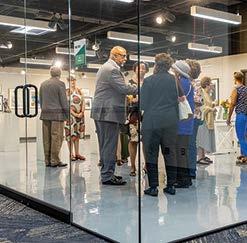
The 31-year-old facility provides space for credit and non-credit instruction, business and industry training to support economic and workforce development, the WCC Police Academy, music and the theatre arts in the 480-seat Towsley Auditorium, as well as community organizations, business and civic events.

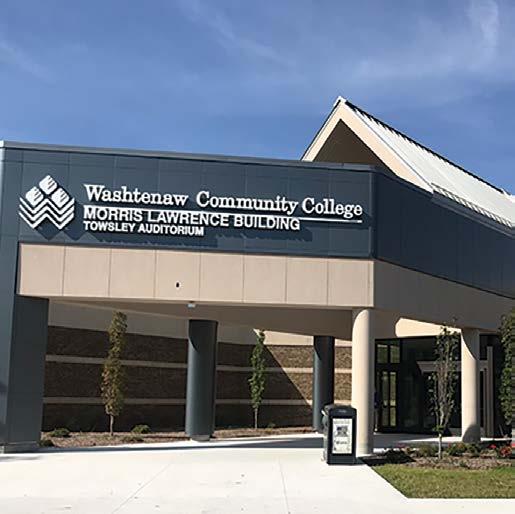
SERVING OUR COMMUNITY
WCC vet center/fitness center host legendary Murph Challenge
Community members and veteran students alike brought their game to a legendary Memorial Day fitness challenge hosted at The Health & Fitness Center and organized by WCC’s Wadhams Veterans Center.
Participants in the Murph Challenge completed a 1-mile run, 100 pullups, 200 pushups, 300 squats and another 1-mile run — all while wearing a 20-pound vest or body armor.
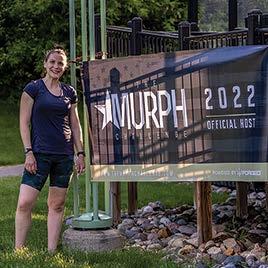
Named for Navy Seal officer Lt. Michael P. Murphy, who died in combat in Afghanistan in 2005, the challenge is hosted throughout the country and raises money for scholarships.
Vet Fest 2022 comes to WCC campus on July 23


Washtenaw Vet Fest 2022 attracted more than 400 military veterans and their families for a day of free food, fun and information.
The Wadhams Veterans Center at WCC worked closely with the Region 9 Veterans Community Action Team (VCAT9) to organize the event. Vet Fest 2022 was such a huge success that plans are in motion to make this an annual event.

More than 50 veteran service providers and agencies exhibited information about their organizations.



Visitors annually to the Morris Lawrence Building

COMMUNITY
SERVING OUR
“ 16
VETERANS
150,000
17
THOUSANDS OF TRADE PARTNERS CONVERGE ON CAMPUS


When Washtenaw Community College’s four trade union partners all returned for their instructor training programs this summer, it meant more than an estimated 4,000 guests on the college’s campus. Those guests also brought an estimated economic impact of $20 million to Washtenaw County, according to Destination Ann Arbor.
Approximately 175 members of the United Union of Roofers, Waterproofers and Allied Workers kicked off the busy summer in mid-June, followed by 110 members of the Operational Plasterers and Cement Masons International in mid-July, 650 members of the Ironworkers in late July and more than 3,000 members of the United Association of Plumbers and Pipefitters in mid-August.






“We are thrilled to welcome back to campus so many of our valued trades partners,” said WCC President Dr. Rose B. Bellanca. “The skilled trades play an essential and important role in supporting and building better communities, and we are very proud of the relationships we’ve built with these organizations.”
Michigan Governor Gretchen Whitmer was among the dignitaries to welcome the United Association back to the area after a two-year hiatus due to the COVID-19 pandemic. She was a special guest speaker at the union’s Industry Day on campus.
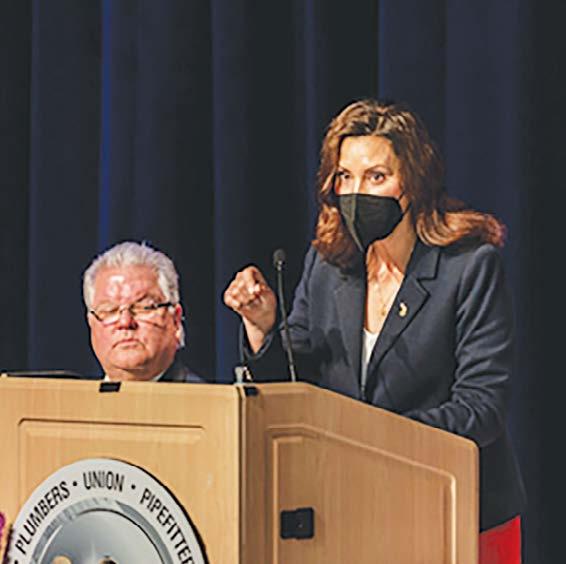
“We love having the UA instructor training program here in Michigan and truly appreciate the resources that you invest here in Washtenaw County,” Whitmer told the group of UA members and other industry leaders.
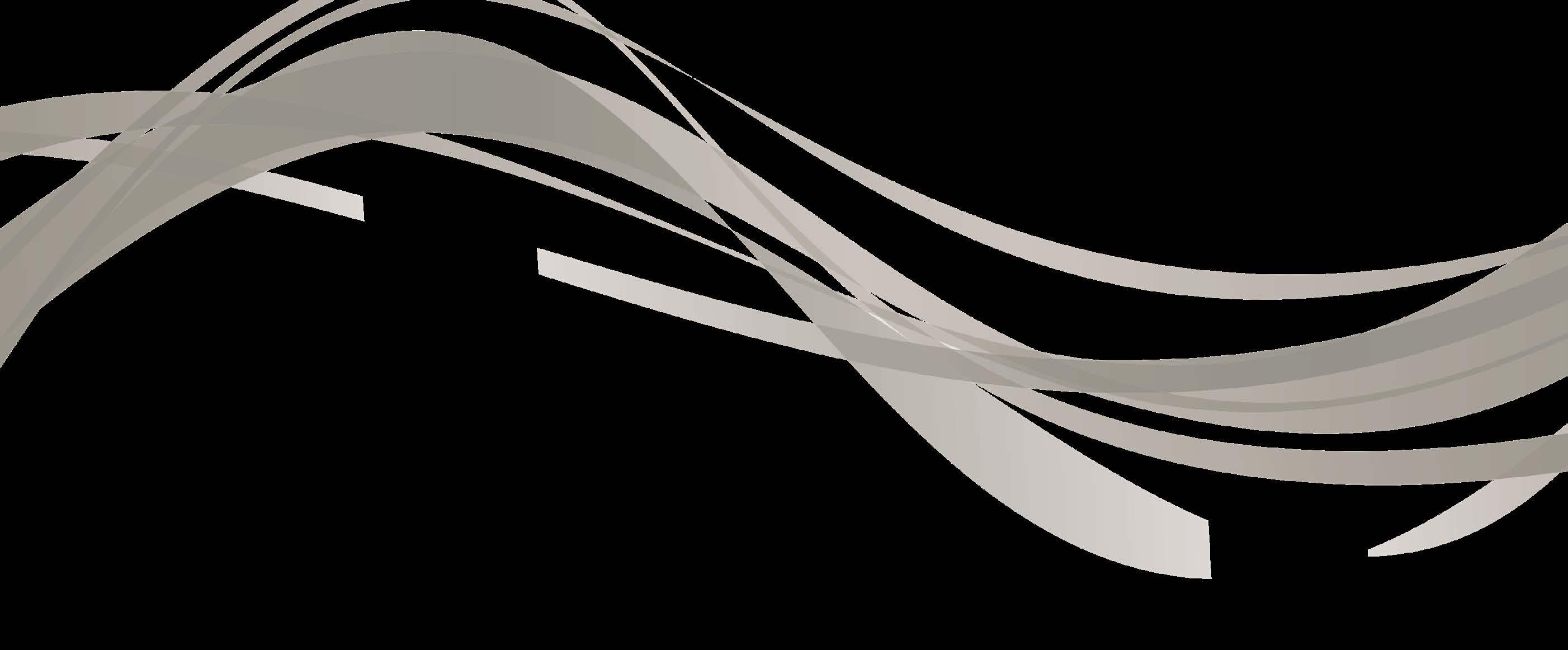
All four of WCC’s union partners conduct a train-the-trainer curriculum, including many courses and hands-on laboratory instruction led by WCC faculty members. Trainers then return to their home locals around the country and internationally to train their members.

An 8,800-square-foot addition to the Great Lakes (GL) Regional Training Center this year underscored the long-time partnership between the United Association and Washtenaw Community College.




Designed by the UA to meet its needs, the expansion features two classrooms, three labs and additional equipment storage space. Completion of the year-long construction project consolidates all dedicated UA training spaces within the GL building, enhancing its weeklong Instructor Training Program – which brings thousands to campus – and provides additional classroom space for the college to utilize during the UA off seasons.
While the UA’s summer week is the busiest on campus, the UA has maintained a year-round presence on the WCC campus since the GL building opened in 2003.
ECONOMIC DEVELOMENT 175 110 650 3,000 FOUR TRADE UNION PARTNERS
UNION ROOFERS OPERATIONAL PLASTERERS IRONWORKERS UNITED ASSOCIATION OF PLUMBERS A WARM WELCOME BACK TRADES SKILL COMMERCE ENTERPRISE INDUSTRY 18
ATTENDENCE
19
Great Lakes Regional Training Center
AWARDS & HONORS
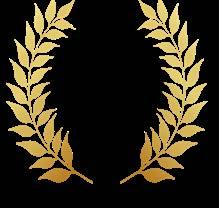
STATEWIDE STUDENT AWARD





Alumna
WCC’s
WCC’s

TWO WCC STUDENTS NAMED TO COCA-COLA ACADEMIC TEAM

Two Washtenaw Community College students were recognized among 100 high-achieving community college students nationwide. Rachel Rubanguka was one of 50 “Gold Scholars” and Daria Skalitzky one of 50 “Silver Scholars” named to the Coca-Cola Foundation Academic Team.
Every year, the WCC Student Development and Activities department nominates two members of the college’s Phi Theta Kappa honor society. This is the first time both nominees were named to the PTK Michigan All-Academic Team and the national Coca-Cola Academic Team.
“Winning the Coca-Cola scholarship showed me that there is nothing I can’t achieve if I really worked for it,” said Rubanguka, whose Gold Scholar status came with a $2,000 scholarship. A native of the Democratic Republic of Congo who lived in Rwanda as a war refugee for 17 years, Rubanguka studied Pre-Engineering at WCC and is currently enrolled at the University of Michigan as a Data Science major.
Skaltizky, also a first-generation American, completed a General Studies in Math and Natural Science degree at WCC and is using her $1,500 scholarship to study cognitive science at the University of Michigan.
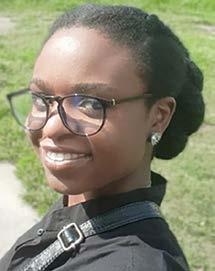


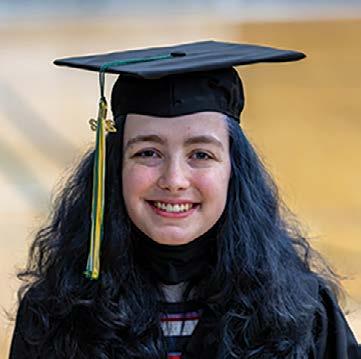
WCC was recognized as a Bee Campus USA affiliate for the third consecutive year for enhancing pollinator habitats and educating the community. The college created or enhanced 28,800 square feet of pollinator habitats on campus.
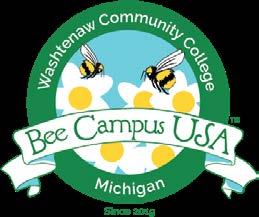

For the fifth consecutive year, WCC was honored with Tree Campus Higher Education recognition from the Arbor Day Foundation for its commitment to effective urban forest management.

Bee Campus USA Affiliate for third consecutive year.

WCC earns Tree Campus Higher Education recognition for sixth consecutive year
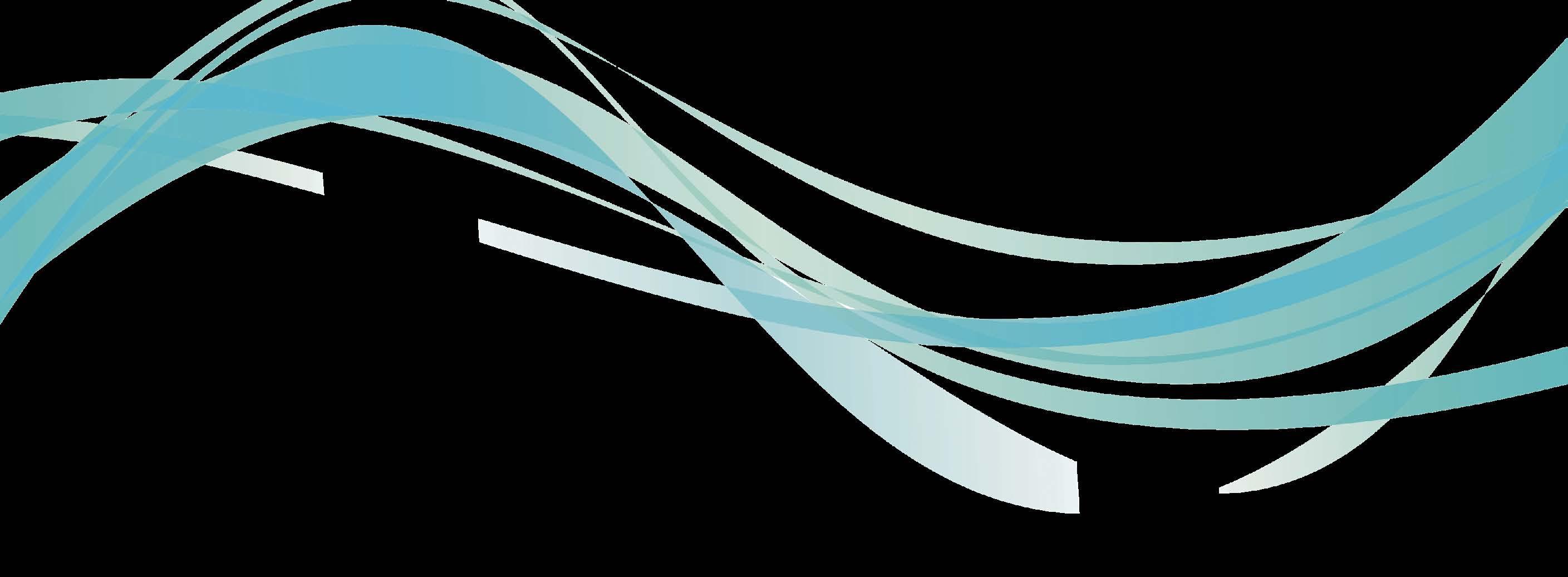
HONORS
WCC video students win five Student Production Awards, 14 nominations
Kristy King received an industry honor for work done in a unique partnership with
Communication, Media & Theater Arts department and Eastern Michigan University. King interned in EMU's Athletic Media Relations office and was recognized for her work on the Eagle Vision Production team that broadcasts NCAA athletic events on ESPN3 and ESPN+. King won second-place in the Michigan Association of Broadcasters’ 2022 Student Broadcast Awards in the Television Sports Announcing category for color commentary during EMU volleyball broadcasts.
Kimberly Schamberger won first place in the Michigan Association of Broadcasters (MAB) Student Broadcast Awards
Kimberly Schamberger, a high-honors graduate of the WCC Film Studies program, won first place in the Michigan Association of Broadcasters (MAB) Student Broadcast Awards in the Radio PSA category. Another WCC project – created by the team of Kristy King, R.J. Hunt, Paul Bailey and Ella Sota – earned third-place in the same category.
WCC digital video students Quinton Myricks (Director), Annie Einheuser (Photographer), Varga Changizi (Music Video), and Shane Dasine and Michael Russell (Commercial) won first place honors in the Student Production Awards from the Michigan chapter of the National Academy of Telivision Arts & Sciences.
14 total nominations were second only to Michigan State University (24). The awards are open to all two-year and fouryear institutions in the state.
Best Of
WCC’s Kristy King won second-place honors in Michigan 2022 Student Broadcasters Awards
20
WCC-EMU BROADCASTING PARTNERSHIP LEADS TO
21
WCC was Honored by the American College of Sports Medicine (ACSM) Exercise is Medicine Initiative
WCC was honored by the American College of Sports Medicine (ACSM) Exercise is Medicine initiative for its efforts to create a culture of wellness on campus. The 2022 honor marks the fourth consecutive year the college earned silver-level designation from the organization, which calls upon higher education institutions to promote physical activity as a vital sign of health and encourages faculty, staff and students to work together to improve the health and well-being of the campus community.
Student Voter Registration Turnout Increased Significantly

WCC was honored for excellence in student democratic engagement by the ALL IN Campus Democracy Challenge in November 2021. The college’s student voter registration and election day turnout jumped by double-digit percentage points compared to four years prior. The college’s Student Development and Activities department leads a student team focused on voter registration, education and engagement initiatives every semester.
“I am a huge advocate for voter registration because we all deserve to be heard. Voter registration is an important stepping stone in creating change for our future.”
WCC Means Business With Exemplary Online Learning Awards For Key Courses





Nine different WCC online courses earned Exemplary Course Program Award status, making up roughly 17% percent of all awards Blackboard, Inc. granted to schools, colleges and universities around the world.




“Online classes are more important than ever as students look for alternative ways of learning, and WCC’s commitment to quality online education continues to be at the forefront of our strategic initiatives,” said Eva Samulski, WCC Dean of Business & Computer Technology. Each of WCC’s honored courses were created by faculty in the college’s Business department.
“Blackboard’s award is a valued third-party verification of what we already believe to be true after our own internal peer-review process – that all of our online courses are rigorous, well-designed and easy to follow.”
22 9 WCC ONLINE COURSES RECOGNIZED AS ‘EXEMPLARY’ 1 2 3 4 5 6 7 8 9 Retail Principle and Practices Warehousing and Logistics Business Communication Principles of Management Transportation and Logistics Supply Chain Field Studies Organizational Management Human Resources Management Motivating Employee s – a course designed for use in the United Association training program 23 AWARDS & HONORS
Gabi Holback, WCC student
BOARD CHAIR William G. Milliken, Jr. VICE CHAIR Angela Davis
BOARD OF TRUSTEES
TREASURER David DeVarti SECRETARY Ruth A. Hatcher
TRUSTEES
MISSION
VALUES
Teaching and Learning: We embrace teaching and learning as our central purpose. Support: We make every effort to help learners achieve success. Diversity: We respect differences in people and in ideas. Partnerships: We plan and work together with respect, trust, and honesty within the College and with the communities we serve. Innovation: We seek the best possible ways to conduct our work.
VISION
WCC is a learner-centered, open-door college dedicated to student, community and staff success. We offer a wide spectrum of community college services with an emphasis on premier technical and career educational programs. The College staff continuously learns to improve learning.
Community College does not discriminate on the basis of religion, race, color, national origin, age, sex, height, weight, marital status, disability, veteran status, sexual orientation, gender identity, gender expression, or any other protected status in its programs and activities. The following office has been designated to handle inquiries regarding non-discrimination policies: Vice President of Student Services, SC 251, 734-973-3536. Facility access inquiries: V.P. of Facilities, Development & Operations, PO 112, 734-677-5322 If you have a disability and require accommodation to participate in this event, contact Learning Support Services at 734-973-3342 to request accommodations at least 72 hours in advance. © 2022 Washtenaw Community College.
Title II Student Right to Know and Campus Security Act Compliance Statement

The Student-Right-to-Know and The Crime Awareness & Campus Security Act of 1990 (also known as the Clery Act) requires institutions to disclose information about graduation rates, crime statistics, and security information to current and prospective students. Individuals interested in obtaining this type of information should contact the Dean of Students office at 734-973-3328.
Copyright 2022 Washtenaw Community College
Christina M. H. Fleming Richard J. Landau, Ph.D., J.D. Diana McKnight-Morton
WCC PRESIDENT Rose B. Bellanca, Ed.D.
Our College strives to make a positive difference in people’s lives through accessible and excellent educational programs and services.
Washtenaw Community College is accredited by The Higher Learning Commission, 230
Street, Suite
Chicago, Illinois
ncahlc.org. Contact
for information
Community
Compliance Statements Washtenaw
South LaSalle
7-500,
60604-1411; 800-621-7440;
734-973-3300
about Washtenaw
College. ADA/EEO/Title IX/Section 504
11/2022; 1.5M

 William G. Milliken, Jr.
William G. Milliken, Jr.
 Chair, Board of Trustees
Chair, Board of Trustees







 Rose B. Bellanca, Ed.D. President, Washtenaw Community College
Rose B. Bellanca, Ed.D. President, Washtenaw Community College



























 DR.
DR.













































































